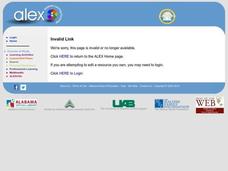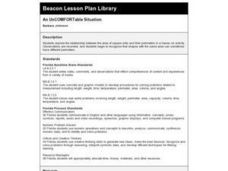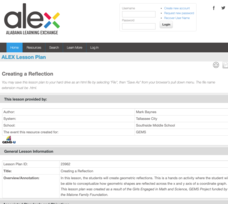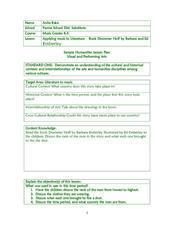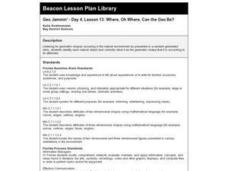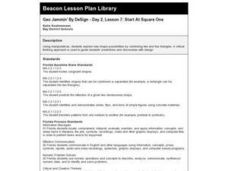Curated OER
Shaping the View: Composition Basics
Students are introduced to the concept of composition in visual art. They examine various compositional structures and practice identifying the focus of various pieces of art.
Alabama Learning Exchange
Understanding Fractions
Young learners explore fractions and demonstrate parts of a whole by using a candy bar and a piece of paper and dividing both into equal parts. Included is a worksheet that requires youngsters to color in half of each polygon shape. Some...
Alabama Learning Exchange
Abundant Area
Explore the relationship between perimeter and area. Learners input the area and perimeter for shapes on the Shape Explorer website, solve problems using geoboards, complete a worksheet, create a PowerPoint presentation, and take an...
Curated OER
An Uncomfortable Situation
If shapes have the same area, do they always have the same perimeter? Learners explore the relationship between the area of square units and their perimeters in a hands-on activity. Observations are recorded, and they begin to recognize...
Curated OER
Planting a Rainbow Bulletin Board
Students explore a variety of colors and shapes after reading the story, "Planting A Rainbow," by Lois Ehlert. The tracking and reading of labels attached to diagrams form an experience in vocabulary development in this lesson.
Alabama Learning Exchange
Creating a Reflection
Investigate geometric reflections in this geometry lesson. Create geometric reflections that show the reflection across the x and y axis of a coordinate graph. Learners watch a teacher demonstration before proceeding on their own. They...
Curated OER
Polygons: Angles vs. Sides
Students analyze the relationship between the number of sides of a polygon and the sum of its angles. Pattern blocks are utilized to trace the outside of the shapes. They make their own outline of a four-sided polygon from the replica of...
Curated OER
Polygon Perimeters
Fourth graders practice finding the perimeter of shapes. In this measurement lesson, 4th graders review the meaning of perimeter and work in groups to draw polygons with differing perimeters. Students share their polygons...
Curated OER
Give It a Whirl
Students examine and identify polyhedron shapes on a math website. They write journal reflections about two- and three-dimensional shapes, and transform a square into a pinwheel.
Alabama Learning Exchange
Dog Gone Again!
Here is a real-life lesson! Learners must plan the dimensions of a rectangular fence to reign in a runaway dog. They survey what shape and size fence is needed and use formulas to find perimeter and area of the fence. They explore what...
Curated OER
Applying Music to Literature
Kids explore music, history, culture, and literature in a multi-faceted lesson plan. They discuss how both historical and cultural contexts shape music, art, and literature, and then apply these concepts as they engage in a listening...
Curated OER
Geo Jammin' - Day 4, Lesson 15: Geo Jingo Jivin'
Second graders explore how musical instruments h ave varying geometric shape, and how those geometric shapes correspond to three-dimenaional shapes that students have studied.
Curated OER
Roger Brown
Students examine and discuss the use of symmetry in a painting by the artist Roger Brown. They draw a geometric shape, divide it with a line of symmetry, and create a painting using the geometric shapes demonstrating symmetry.
Curated OER
Geo Jammin' - Day 4, Lesson 13: Where, Oh Where, Can the Geo Be?
Learners listen to a story "My Crazy Dream" with an intent to identify shapes in ordinary objects. They raise their hands when they've heard an object whose shape they can identify. They discuss their findings.
Curated OER
Geo Jammin'
Students compare and contrast related two- and three-dimensional shapes, and complete a Venn diagram illustrating the attributes of each. Using a poem pattern from another lesson, students use data from the diagram to write an attribute...
Curated OER
Geo Jammin' By DeSign - Day 2, Lesson 7: Start At Square One
Students examine new shape possibilities by combining two and four triangles using manipulatives.
Curated OER
Who Am I? (Middle School)
Third graders complete a classroom game used to build understanding of two and three-dimensional shapes. Diagonals, sides, regularity, congruency, angle measurements, parallels, perpendicular, faces, and edges are a few of the vocabulary...
Curated OER
Let's Draw!
Learners practice their drawing skills using a variety of stories as sources for their inspiration. Crayons and pencils are utilized to model different line widths, textures, and shapes.
Curated OER
Triangles and Things
Young learners listen to the story book The Greedy Triangle as the teacher introduces new polygon shapes. They use geometric stencils to trace a quadrilateral, a pentagon, a hexagon, and an octogon onto a foldable notepad....
Curated OER
Pacing a Gunther Chain
Students pace a Gunther Chain, a measurement used by foresters to determine distance and area. They discuss that pacing is individualized depending on age, gender, etc. They practice to find an average pace. Teams estimate, pace and...
Curated OER
Family at Home
Students fold paper to form a house, then use three numbers to make fact families for their houses. They write a family of multiplication and division facts on a piece of paper cut in the shape of a house.
Curated OER
Does Your Rectangle Have Guts?
Does it? Kids find the perimeter and area of different shapes to assess whether their rectangle has guts. In addition to finding the area of a rectangle, learners work to find the area of a trapezoid. All worksheets are included.
Curated OER
Goldsworthy Project: Building With the Five Elements of Art
Seventh graders explore the five elements of art: line, shape, value, texture and color. They collect items from nature and arrange them aesthetically taking the five elements into consideration. They consider their work from several...
Curated OER
Real World Equations!
Help your math class "get the picture" in a quadratic equation lesson that integrates digital photography. Individuals take pictures to help them model the shape of an item or situation using algebraic equations. They discover how to...

